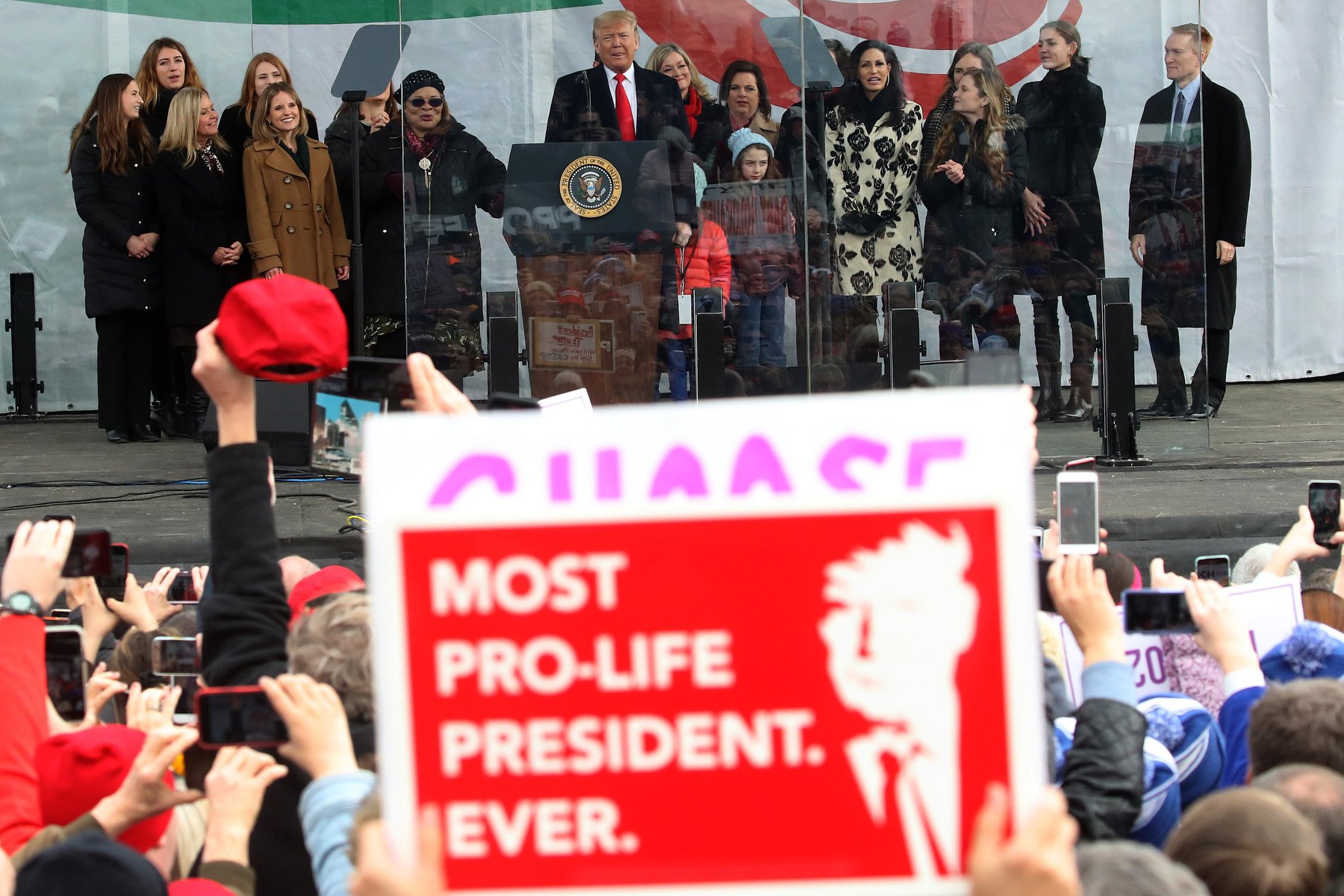With President Donald Trump back in office, activists and lawmakers are pressing for federal action that would further weaken access to abortion. But abortion has been notably absent from the executive actions in the first days of the new administration.
In his last term, Trump pushed anti-abortion policies: He nominated judges who opposed reproductive rights, eliminated federal funding for organizations that refer patients for abortion, and promised to overturn Roe v. Wade. He was the first sitting president to attend the March for Life, the nation’s biggest anti-abortion gathering. And in his failed 2020 presidential campaign, he pledged to pursue more restrictions on abortion if sent back to the White House.
With federal abortion protections eliminated, Trump has backed away from publicly supporting anti-abortion policies, even while some state lawmakers have pressed for more restrictions after his victory. Polling shows that abortion bans are broadly unpopular, including among voters who lean Republican.
“I’m not as convinced as some people seem to be that Trump’s going to do everything he can,” said Greer Donley, a law professor at the University of Pittsburgh who tracks abortion policy. “It’s hard to feel confident about anything when it comes to what their strategy is.”
Since taking office Monday, the Trump administration has taken down a government website that informed readers of legal avenues to access abortion. On Thursday afternoon, Trump pardoned a number of anti-abortion protesters who had been convinced of violating the Freedom of Access to Clinic Entrances Act, which prohibits using or threatening physical force to block people from getting abortions as well as deliberately damaging reproductive health clinics.
But despite issuing a deluge of executive orders, Trump has not yet issued any new abortion policies.
The delay is noteworthy given Trump’s hesitation to clearly endorse some anti-abortion goals — including enacting a new national ban on the procedure or reviving an 1873 law known as the Comstock Act to cut off access to abortion pills — during the recent presidential campaign.
“He’s done so much in such a short amount of time that it’s still striking he isn’t doing anything about this,” said Mary Ziegler, an abortion law historian at the University of California, Davis. “The longer it takes, the more people wonder how much he’s going to do at all.”
There is still plenty of time for Trump to pursue abortion restrictions, and enacting them later in his term could be an effective way to minimize attention on policies that most voters don’t support. But Republicans and some abortion opponents are urging him to get started.
“I don’t feel like it’s too late,” Kristi Hamrick, vice president of media and policy at Students for Life said before Trump had issued the pardons. “But I certainly do hope Friday to see something,” she said, referencing the annual March for Life, which Trump will address over video. Vice President JD Vance will speak at the event, organizers announced Thursday.
On Wednesday, 144 Republican members of Congress, including 35 senators, signed a letter saying they “look forward to the reinstatement” of anti-abortion policies instituted during Trump’s previous term. They specifically cited changing the federal Title X program, which supports family planning providers for low-income people, to bar health providers who refer patients for abortion from being eligible for its support, which Trump did in his first term.

Also on Wednesday, a group of anti-abortion groups led by Americans United for Life — including Students for Life, Heartbeat International and National Right to Life — sent a letter to Acting Attorney General James McHenry, urging the Department of Justice to enforce the Comstock Act to outlaw mailing abortion medications, which are used in the vast majority of abortions. Such a step could cut off access to the procedure for people in states where it is legal, and create new roadblocks for a network of health providers who prescribe and mail the pills to patients in states with bans.
Reviving Comstock, which has not been enforced in decades but was never repealed, is a top priority for many abortion opponents, who view it as a vehicle to enact national restrictions on the procedure. In August, Trump said he would not enforce the law if elected, though others in his orbit — including contributors to the conservative policy blueprint Project 2025 — have endorsed doing so.
The White House did not respond to multiple requests for comment about Trump’s lack of abortion-related policy or executive orders this week.
Even with full control of the legislative branch, some congressional Republicans appear to be following Trump’s lead, and steering their energies away from 15-week or near-total abortion bans and instead focusing on what they call “late-term” abortions — a term with no medical meaning — and “defunding” Planned Parenthood.
Senate Majority Leader John Thune, who has previously supported a national 15-week abortion ban, this week backed a bill blocked by Senate Democrats that would have penalized health care providers who do not “exercise the proper degree of care in the case of a child who survives an abortion.”
The legislation, which proponents call a “born-alive bill,” targeted a subset of abortions performed after fetal viability, typically around 23 to 25 weeks, even though they are incredibly rare — in 2021, less than 1 percent of all abortions were performed after 21 weeks of pregnancy, per the Centers for Disease Control and Prevention. Typically, these are the result of a late miscarriage or an abortion that was performed because of dangerous medical complications that have emerged late in pregnancy. Very few result in live births.
Critics of this type of bill say it targets a problem that does not exist and could in some cases force physicians to give care to infants with complex fetal anomalies that would prolong their lives but not save them, and that it could make them deny newborns palliative care instead.
The bill received support from influential anti-abortion groups including SBA Pro-Life America and Students for Life. But it’s still a step back from the more sweeping restrictions those groups have previously championed, such as national restrictions or reviving Comstock.
Hamrick suggested her organization would not be pushing for a national abortion ban. While she and other members of Students for Life met congressional lawmakers in Washington this week, they did not get a meeting with the president.
Instead of a national ban, she said, “in this current movement, the pro-life movement legislators will meet President Trump to address what he has identified.” Her organization will also continue to press for revival of the Comstock Act, she said.
Thune’s office did not respond to multiple requests for comment, including whether his office would still prioritize a 15-week ban on abortion, as he has in the past. A spokesperson for Sen. James Lankford, an Oklahoma Republican and the sponsor of the “born-alive” bill, would not directly answer whether a 15- or 20-week ban would also be on the table, simply calling his current legislation “a major priority.”
Lankford has in the past backed proposals for a 20-week abortion ban and has reportedly supported a national six-week ban.
Republicans have also pushed for revamping federal family planning programs so that they no longer support groups like Planned Parenthood — including legislation from Missouri Sen. Josh Hawley that would bar public dollars from supporting organizations that “perform, provide referrals for, or provide funding for, abortions.”
Hawley’s bill would codify an approach Republican presidents have typically adopted when in office — issuing regulations that bar funding from the Title X program to any organization that refers patients to abortion providers. Planned Parenthood is the largest individual health care provider to participate in the program. Trump has not yet directed his government to take this approach, though he did during his previous term — resulting in service reductions that affected 1.6 million patients, and more than 400 Planned Parenthood clinics and more than 600 other health centers losing federal funding.
“Defunding” Planned Parenthood is a long-held GOP policy position, and one that could undercut access to health care services including contraception, HIV testing and care, and screening for sexually transmitted infections. Still, it’s a far less ambitious goal than the 15-week national ban that Hawley has previously supported. When asked if Hawley still supported that policy, a spokesperson directed The 19th to a series of statements including one suggesting that he would back “reasonable federal restrictions.”
The change in scope is telling, Ziegler said.
“Things could change and they could feel differently in six months or a year, but there doesn’t appear to be a big appetite at the moment” for sweeping abortion restrictions, Ziegler said. “There’s a fear that it’s a political loser.”






